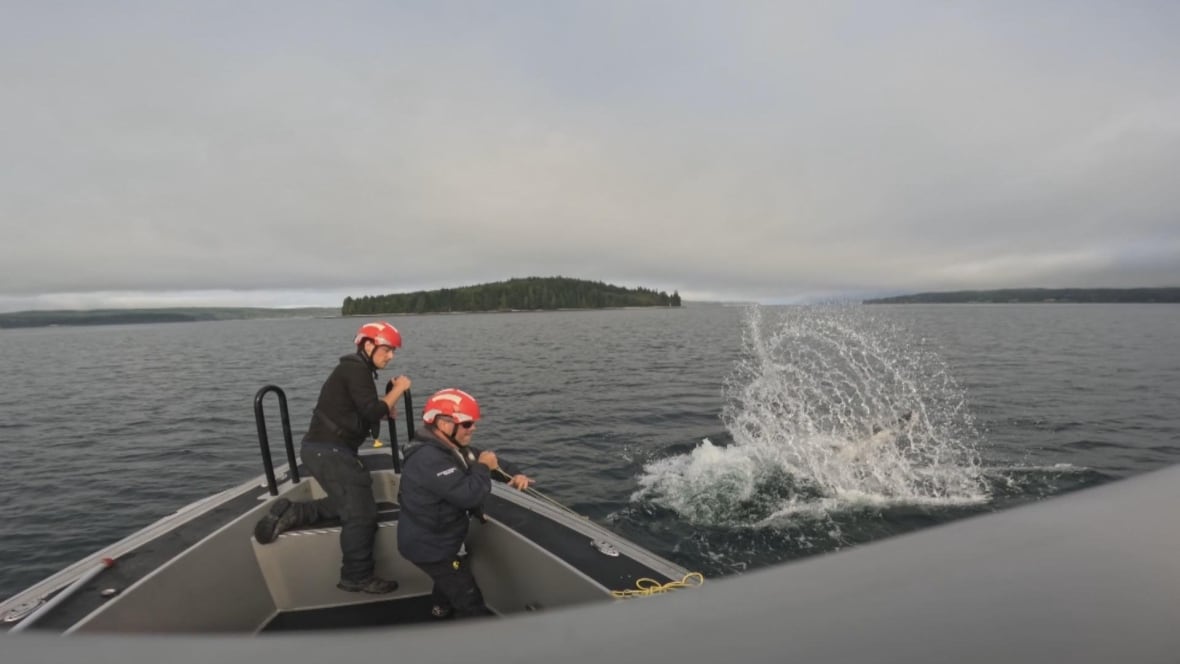Humpback whale tangled in fishing gear on B.C.'s coast freed after 3-day rescue

A humpback whale is swimming free after some major dedication and perseverance from rescuers on B.C.'s coast.
The four-and-a-half-year-old whale was spotted tangled up in fishing gear on Thursday, Sept. 4, by vacationing coast guard employees out on a sailboat, according to Paul Cottrell, marine mammals coordinator with Fisheries and Oceans Canada (DFO).
Cottrell and his team mobilized, travelling by boat from the mainland to the Black Creek area, just north of Comox on Vancouver Island, about 100 kilometres northwest of Vancouver.
With help from another recreational boater who spotted the struggling cetacean, the fisheries team and members of local marine mammal monitoring non-profit Straitwatch were able to locate and start working on the humpback.
But the whale, a male known as Tutu, didn't make it easy.
"This animal just wouldn't stop in terms of its stamina," Cottrell told CBC's On The Coast. "Normally an animal gets tired over time and you can get closer and start removing the gear fairly quickly but this was not the case."
It took the team three days to entirely free the whale.

On the first day, Cottrell said he was able to remove about 100 metres of rope from the animal — but there was more work to be done, and the whale just kept on moving. The rescue team had to call it quits for the night as darkness fell.
The team found the whale again on Friday near Port McNeil, about 165 kilometres northwest of Black Creek, and worked another nine hours to remove the remaining gear.
"It just was relentless in terms of action and activity level," Cottrell said. "And you have to do this really slow and careful because it is dangerous. This is a 30-tonne animal … it's full of energy — breaching, doing crazy behavioural modification, changes in direction."

By Friday night, they had removed another 30 metres of gear from Tutu, but it was still tangled up in two fishing lines. They attached a satellite tag to one of the lines so they could track the whale and easily find it the next morning to finish the job.
But on Saturday morning, they found that Tutu had freed himself.
"We couldn't believe it," Cottrell said. "The animal I guess had done some twists and turns and actually unwound the remaining 85 or 90 feet."
While Tutu did have some lacerations from the ropes, Cottrell said they were fairly superficial, and the whale is expected to go on to live a healthy life.
Tutu is one of several whales that fisheries teams have been sent to disentangle in recent weeks; Cottrell said there have been four entangled humpbacks in the last couple of weeks alone.
"It's been very, very, very busy year for sure."
He attributes the frequency of whale rescues to the return of humpbacks in the Salish Sea, after local numbers dwindled to near extinction due to the commercial whaling industry in the 20th century, according to marine naturalist Tasli Shaw.
"This flood of animals back into these habitats has been tremendous, but we are seeing more gear interactions because they are in these inshore waters," Cottrell said.
Lara Sloan with DFO said "debris is a real problem for marine wildlife."
She said the public can help prevent entanglements by cutting up packing material, banding, rope and any other looped material before throwing it away, and never disposing of those kinds of materials in a marine environment.
cbc.ca




